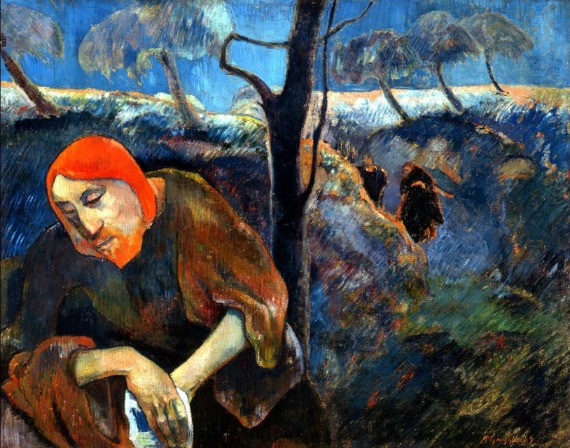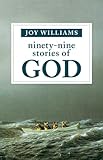 1.
1.
We sat in a semicircle with Dorothy in the center, an open copy of the Good News Bible on her lap. She wore a t-shirt with “Maine” printed below an image of a fly fisherman. He’d hooked a trout but the fish was twice his size. I tried to understand how that was possible. I’d seen shows on ESPN where harried outdoorsmen wrestled sturgeons in Alaskan rivers but I’d never met a trout longer than my arm. That line of thought got me halfway through her first reading, something vaguely violent from the Old Testament. She followed that with a selection from the Gospels. She read with a smile, and when she finished she paused and stared at us. I swear she made eye contact with each and every kid there, as if she could read our thoughts. I wondered if she could read mine. David said there’d be pizza, movies, soccer, and swimming. So far I was disappointed.
2.
I can’t quit God if I tried — especially not when it comes to books. Conversion and explanation are not in my wheelhouse; my brand of superstitious Italian-Catholicism via Jesuits always turns faith inward. I would rather criticize myself than someone else. Maybe that’s why I’m interested in books about God, about faith, about our most earnest attempts to be good and our daily actions of being terrible. I like the idea that writers wrestle with words to capture the ineffable. I like that writers fail far more often than they succeed.
3.
I usually spent my summers playing Nok Hockey and lacrosse at Bee Meadow School. The free, public day camp only lasted a few hours a day. We tried to avoid the obligatory craft sessions every Friday, (fill in the blank + popsicle sticks) and got pumped for the end-of-day dodge ball game, cramped chaos in a gym used for theater practice and AA meetings. Our counselors were college students home on break, who flirted with each other, beat us soundly in soccer games, and lied about finding dead bodies floating in the pond behind the school. Once I was sent home for calling another kid chicken-face-punk. Someone else told me to say it but I accepted the punishment. My sister picked me up and took me to Dairy Queen. The next day I was back, turning paper-towel rolls into glasses. (Craft classes were the halfway-house for suspended students.)
David and I played 21 at the basketball court. He flailed, threw elbows, and made left-handed layups. He kept his mouth shut during games, which was a blessing compared to the counselors, whose trash talk reached epic proportions. At the end of our game, David and I bought Gatorades from the snack bar and sat in the gym. Two upright fans spun hot air across the stage where three girls sang something from Mary Poppins. The next day was my least favorite of the year, the Six Flags trip. I hated roller coasters; so did David. He knew that, and I suspect that was why he asked if I wanted to go to Bible camp with him instead. He listed the activities and none of them had anything to do with the Bible. In fact, the words Bible and camp didn’t come into the conversation until later. He just asked if I wanted to go to Blue River, and I said yes.
I asked my mom if I could go to Blue River with David. She asked if I needed my fishing license. I explained that it had to do with his church. She sat me down, and though I don’t remember the exact content of her conversation, it sounded awfully close to a warning — as in look but don’t touch, and certainly don’t taste. Catholics don’t have Bible camps. At least not the Catholics I knew — Italian, Irish, and Portuguese immigrants in Whippany, NJ. We had retreats, lock-ins, CCD classes, but we never talked about Jesus in public. I don’t think we were ashamed — it just didn’t seem right. It was as if we were opening up about a personal secret that evaporated the second it met air.
At Blue River people talked about Jesus like he was their second cousin. They held hands during responses and never crossed themselves. Pamphlets leaned forward in wooden shelves. It was easy to tell the bad ones (thunder-stuffed clouds and tears) from the good ones (sunshine and high grass). There was a lack of men, and a plethora of fanny packs and hummed hymns. Most kids called their parents halfway through the day. I declined. I really had no idea what to say.
4.
 Joy Williams reminded me of the strangeness of God in her 99 Stories. I had found God in her sentences before, but it was nice to see her sprint headlong into the divine. I escape in similar ways in the writing of Ron Hansen, Toni Morrison, and that heretic from the Bronx, Don DeLillo. I have this quirk where I always want to know a writer’s religious interest; it helps me grasp how that writer understands atmosphere and setting. I have a special place in my literary heart for the lapsed: those who grew up looking up — who decided one day to drift. I have friends who sometimes drift back into church, like they are returning home, before leaving again. Then they return to their essays, stories, and poems, that contain shadow of God without any outline.
Joy Williams reminded me of the strangeness of God in her 99 Stories. I had found God in her sentences before, but it was nice to see her sprint headlong into the divine. I escape in similar ways in the writing of Ron Hansen, Toni Morrison, and that heretic from the Bronx, Don DeLillo. I have this quirk where I always want to know a writer’s religious interest; it helps me grasp how that writer understands atmosphere and setting. I have a special place in my literary heart for the lapsed: those who grew up looking up — who decided one day to drift. I have friends who sometimes drift back into church, like they are returning home, before leaving again. Then they return to their essays, stories, and poems, that contain shadow of God without any outline.
But isn’t that how faith is supposed to work? You see the soul, but not the body?
5.
Dorothy stood in front of a long grill, flipping burgers with what looked like a pancake spatula. I thought she was going to quiz me on her reading or say she knew I wasn’t paying attention. She didn’t. She asked if I wanted cheese. I said yes.
Group prayer came after lunch. There was no church or chapel on campus, only a room with folding chairs and fans in the windows, slicing the sunlight. Dorothy was back in Jesus mode, waiting for all of us to take a seat. I was afraid of the inevitable audience participation. After CCD classes we’d converge in the church, where Father John would query us with softball questions about the catechism. Wrong answers were met with a laugh and smirk, not a smack to the palm. But it still made me nervous.
Dorothy spoke softly and we became silent to meet her voice. She asked us to consider what we were thankful for, and then talked about Jesus in a succession of praises. I did not recognize any of these prayers. I was used to the mention of saints and much less talking. For me prayer was silent; communal, yes, but a sort of hushed thought, not a bunch of talk. Dorothy seemed like a nice woman but it sounded like she was trying to talk her way toward God. Or maybe barter something from him.
Years later my wife — another cradle Catholic — and I would be in the middle of a similar group prayer at a showing of The Passion of the Christ. Somehow we were the only two people in the theater who were not congregants of a Pennsylvania evangelical church. I held my breath during that prayer as well. In the midst of Dorothy’s spiel I excused myself to go to the bathroom. Something just didn’t feel right. I snuck out the back of the building. I hid, first, behind the shed where two tractors sat silent in the dark, then in a thin patch of woods behind the unused soccer fields, grass reaching halfway up the goals. All the time I kept my eye on the building and was able to weave back into the procession as it came out. I’m sure somebody noticed but no one said anything, probably because I was only a visitor.
During the ride back home, David’s mom hummed John Denver while we sweated with the windows down. She never used the air conditioning in that burgundy minivan. When I got home I was still hot and rushed into my house. My mom asked what was wrong, but I held up a finger while I downed water. It was a full glass, and it felt like the water would never end. Maybe that was what miracles were really like: small comforts from this wailing world.
Image: Gauguin, “Agony in the Garden,” Wikipedia








